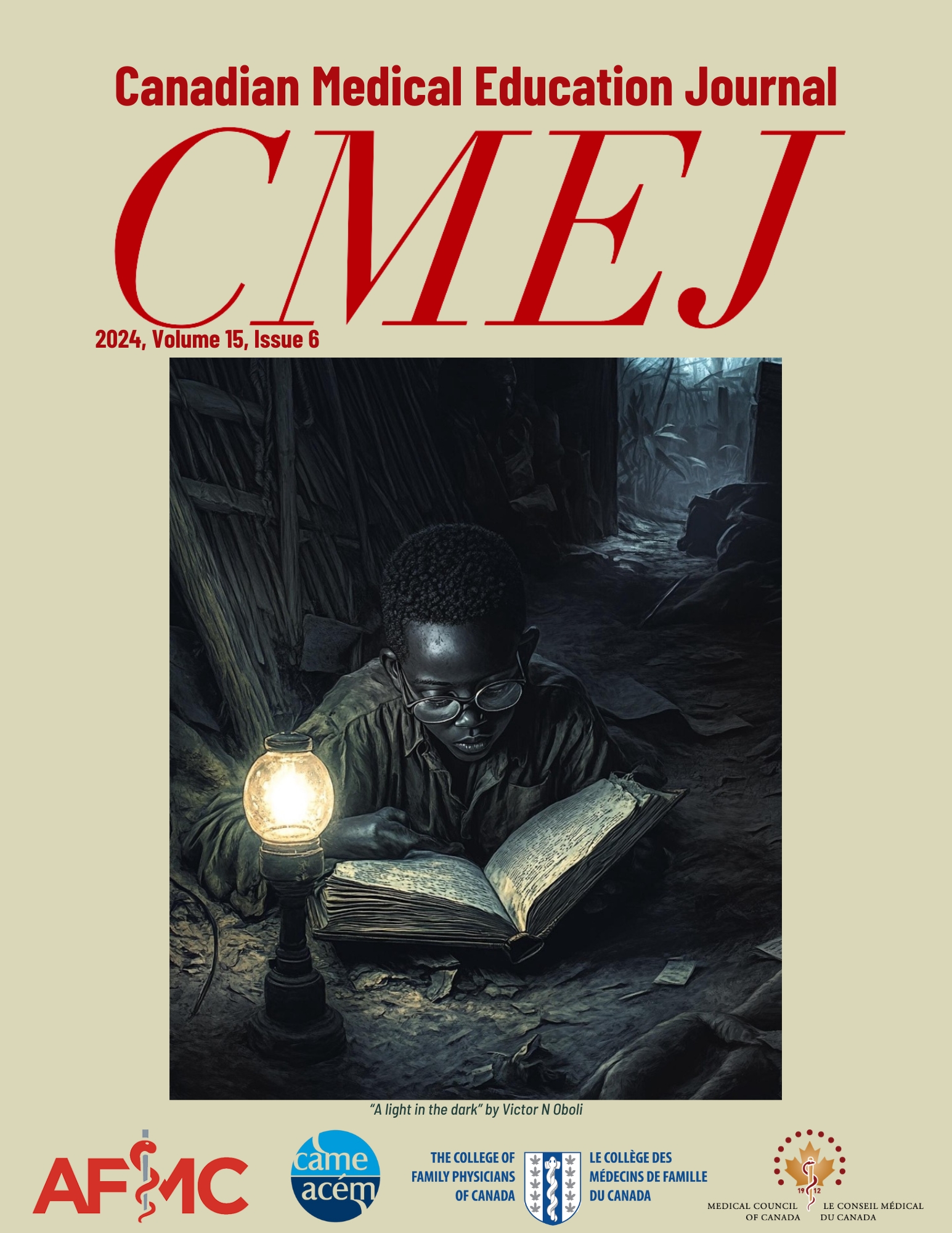Reduced time spent with patients and decreased satisfaction in work during COVID-19 pandemic
DOI:
https://doi.org/10.36834/cmej.78773Abstract
Background: The COVID-19 pandemic disrupted the healthcare system, affecting physician wellbeing. The consequences of reduced time spent with patients at bedside during the pandemic has not been investigated. The objectives of this study include assessing time spent with patients, physician wellbeing and patient satisfaction before and during the pandemic.
Methods: A total of 182 internal medicine physicians used Hill-Rom tracking devices to measure time spent at bedside while on the teaching hospital medicine service between September 2019 and November 2020 at Cleveland Clinic in Cleveland, Ohio. Time spent before and after March 2020, the outbreak of the pandemic were compared. Physicians’ wellbeing was evaluated before and during the pandemic using the Accreditation Council for Graduate Medical Education survey. Patients’ satisfaction was assessed via the Hospital Consumer Assessment of Healthcare Providers and Systems questionnaire and correlated to bedside time.
Results: From 88,661 time records collected during the 65-week study, 44,710 (50.43%) met the quality standards and were included in the analysis. The average time spent at bedside per patient before and during the pandemic was 12.12 and 7.85 minutes, respectively. Time decreased by 3.33 minutes for interns, 6.10 minutes for residents, and 2.70 minutes for staff. The pandemic correlated with physicians’ decreased vitality and meaning in work. Patients’ satisfaction did not correlate with bedside time.
Conclusion: Internal medicine physicians spent less time with patients during the pandemic and had worsened vitality and satisfaction with work. Physicians’ time spent at bedside did not correlate with patients’ satisfaction.
References
Hipp DM, Rialon KL, Nevel K, Kothari AN, Jardine LDA. "Back to Bedside": residents' and fellows' perspectives on finding meaning in work. J Grad Med Educ. 2017;9:269-273. https://doi.org/10.4300/JGME-D-17-00136.1 DOI: https://doi.org/10.4300/JGME-D-17-00136.1
Block L, Habicht R, Wu AW, et al. In the wake of the 2003 and 2011 duty hours regulations, how do internal medicine interns spend their time? J Gen Intern Med. 2013;28:1042-1047. https://doi.org/10.1007/s11606-013-2376-6 DOI: https://doi.org/10.1007/s11606-013-2376-6
Kim CS, Lovejoy W, Paulsen M, Chang R, Flanders SA. Hospitalist time usage and cyclicality: opportunities to improve efficiency. J Hosp Med. 2010;5:329-334. https://doi.org/10.1002/jhm.613 DOI: https://doi.org/10.1002/jhm.613
Shanafelt TD, Dyrbye LN, Sinsky C, et al. Relationship between clerical burden and characteristics of the electronic environment with physician burnout and professional satisfaction. Mayo Clin Proc. 2016;91:836-848. https://doi.org/10.1016/j.mayocp.2016.05.007 DOI: https://doi.org/10.1016/j.mayocp.2016.05.007
Dyrbye LN, West CP, Satele D. Burnout among U.S. medical students, residents, and early career physicians relative to the general U.S. population. Acad Med. 2014;89:443-451. https://doi.org/10.1097/ACM.0000000000000134 DOI: https://doi.org/10.1097/ACM.0000000000000134
Young KP, Kolcz DL, O'Sullivan DM, Ferrand J, Fried J, Robinson K. Health care workers' mental health and quality of life during COVID-19: results from a mid-pandemic, national survey. Psychiatr Serv. 2021;72:122-128. https://doi.org/10.1176/appi.ps.202000424 DOI: https://doi.org/10.1176/appi.ps.202000424
Heluey C, Bahgat J, Hartnett J, Rose SJ, Newman RB, Homayounrooz F. Effects of the COVID-19 crisis on resident well-being in a community teaching hospital. South Med J. 2022;115:712-716. https://doi.org/10.14423/SMJ.0000000000001437 DOI: https://doi.org/10.14423/SMJ.0000000000001437
ACGME program requirements for graduate medical education in internal medicine. 2022.
Babayev R, Tortez L, Kozikowski A, et al. Attending physicians? attitudes towards physical exam and bedside teaching [version 1]. MedEdPublish. 2016;5. https://doi.org/10.15694/mep.2016.000024 DOI: https://doi.org/10.15694/mep.2016.000024
Ching MM, Lee J, Beecroft M. A time-motion study of emergency and hospitalist physicians in a community hospital setting. J Wellness. 2023;5. https://doi.org/10.55504/2578-9333.1150 DOI: https://doi.org/10.55504/2578-9333.1150
Ratelle JT, Herberts M, Miller D, et al. Relationships between time-at-bedside during hospital ward rounds, clinician-patient agreement, and patient experience. J Patient Exp. 2021;8:23743735211008303. https://doi.org/10.1177/23743735211008303 DOI: https://doi.org/10.1177/23743735211008303
Downloads
Published
Issue
Section
License
Copyright (c) 2023 Paige Gurizzian, Jenna Hackenberger, Victoria Shaker, Dhruvika Mukhija, Matthew Bocian, Timothy J Smith, Auron Moises, Bo Hu, Andrei Brateanu

This work is licensed under a Creative Commons Attribution-NonCommercial-NoDerivatives 4.0 International License.
Submission of an original manuscript to the Canadian Medical Education Journal will be taken to mean that it represents original work not previously published, that it is not being considered elsewhere for publication. If accepted for publication, it will be published online and it will not be published elsewhere in the same form, for commercial purposes, in any language, without the consent of the publisher.
Authors who publish in the Canadian Medical Education Journal agree to release their articles under the Creative Commons Attribution-Noncommercial-No Derivative Works 4.0 Canada Licence. This licence allows anyone to copy and distribute the article for non-commercial purposes provided that appropriate attribution is given. For details of the rights an author grants users of their work, please see the licence summary and the full licence.











